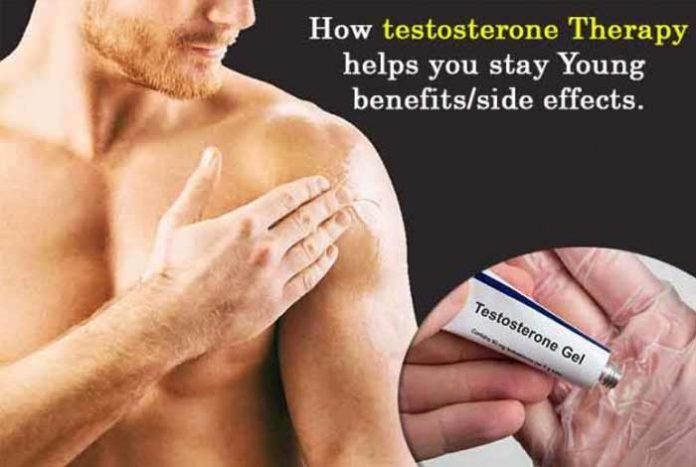
If you are considering testosterone therapy to make you feel younger as you age, you must know its risks and benefits before you take that decision. Testosterone therapy may seem very promising, but there are a couple of misconceptions about what the treatment offers to do for you. Incidentally, the health benefits of testosterone therapy for age-related decline in testosterone level is not very clear.
So, let’s begin by understanding what testosterone is! It is a hormone produced in the testicles. It has many functions like maintaining sperm count and responsible for sex drive as well as facial and body hair. The levels of testosterone are quite high during adolescence and adulthood. With age, the testosterone levels go down. As a matter of fact, it declines by nearly 1% every year after the age of 30 or 40. It is also important to find if low levels of testosterone are due to aging or a disease, known as hypogonadism.
Hypogonadism is an ailment in which the body is unable to produce normal levels of testosterone, because of a problem with testicles or pituitary gland, which control the testicles. Testosterone therapy may boost the levels of low testosterone in men with hypogonadism. Doctors may prescribe testosterone in the form of injections, gels, patches or pellets.
Testosterone therapy may help reverse the effects of hypogonadism. However, it is not clear whether testosterone therapy has positive effects in otherwise healthy men. Some men believe that testosterone therapy may make them feel younger as they age.
Benefits of Testosterone Therapy:
Better Mood: It is a known fact when hormones are out of place, it has effects on your thoughts, body and mind. One may be feeling down without any desire to carry out daily activities if testosterone levels are down. Testosterone therapy helps boost your mood.

- Increased Libido: If testosterone levels are low, desire for sex also diminishes. Sexual desire is a distinctive feature of youth. Testosterone therapy is known to improve libido in men.

- Increased Lean Muscle Mass: Testosterone has an affinity for androgen receptors in the body. This helps gain muscles in people taking testosterone therapy.

- Increased Level of Confidence: Low levels of testosterone may lead to lack of assertiveness and feelings of hesitancy and doubt.

- Less Instances of Fatigue: One of the primary symptoms in men with low testosterone is fatigue or tiredness. After testosterone therapy, men report improvement in energy levels. Low testosterone may also lead to brain fog.

- Improved Gym Performance: One can train with greater intensity after undergoing testosterone therapy. This also leads to development of more stamina and impart feeling of strength.

- Better Recovery: If testosterone levels are low, one may feel sored after heavy training. Testosterone therapy also speeds up healing after injuries to soft tissues.

- Stronger Bones: As testosterone levels fall, bone density decreases leading to weaker bones, known as osteoporosis. Bone density increases with testosterone therapy.

Risks of Testosterone Therapy:
Testosterone therapy has various associated risks that are listed below:
- Sleep Apnea: A sleep disorder in which breathing starts and then stops repeatedly.
- Causes acne or skin reactions.
- Activate noncancerous growth of prostate and existing prostate cancer.
- Breast enlargement.
- Testicles may shrink, and sperm production may be limited.
- There is a greater chance of the formation of blood clot in the veins, which could travel to the lungs through the bloodstream and block the flow of blood. Testosterone therapy may increase risk of blood clot and stroke.
- It may increase the risk of heart diseases.
- Changes in the levels of cholesterol and lipid levels.
- Polycythemia: Red blood cell (RBC) volume in the blood goes up, making the blood thicker and so, increasing the risk of heart attack and stroke.
- It can cause addiction of sorts. Since testosterone is addictive, it can interfere with brain chemistry. When one tries to go off the therapy, there may be incidences of mood swings, insomnia, restlessness and irritability.
- Natural production of testosterone may stop completely. Taking testosterone therapy may shut down the natural production of testosterone inside the body. So, when one stops taking the therapy, he is in a worse off condition.
- Hair loss is one of the side effects of testosterone therapy.
Thus, testosterone therapy should be considered when levels of testosterone are not falling in the normal levels. It is beneficial to men, whose testosterone levels are low. A doctor must be consulted if you want to go for testosterone therapy. A blood test can help determine testosterone levels and evaluate the underlying causes.




